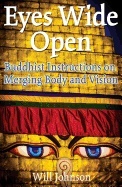Right behind your eyes, you are there. You can feel yourself there, looking. So intimate is your connection with your looking that when you say, 'I'm looking,' you're implying that how you look and what you see are a direct reflection of who you are in this moment. Your attitudes and beliefs reflect what you see and the way you live in your body can colour your perceptions as well.
This splitting in two of experience - an inside-the-body world and an outside-the-body world - creates in many of us a sense of isolation and loneliness, a feeling of disconnection from the larger world at which we look. But the visual field is equally capable of reflecting a sense of connection and inclusion, an invitation to merge with the larger universe rather than confirming how irrevocably separated we are.
Drawing on the story of the seventh-century Chinese monk, Shenxiu, Will Johnson offers meditation exercises to create a mind like a mirror, cleansing it of obscuring layers of worry and emotion to literally see things as they are, not just how we perceive them to be. He explains how to awaken your body to the sensations we learn to ignore when we lose ourselves in thought and tense ourselves in ways that stifle the body's vibrancy. He offers meditative techniques to silence the projections of the mind and enter into a condition of ecstatic mindfulness. He details gazing practices, such as sky gazing, eye gazing and mirror gazing, to cleanse our vision and remove whatever is distorting our perceptions.
Through this new kind of seeing, divisions between your inner and outer world start to drop away. You begin to experience an intimate connectivity to the world you look out onto. By cleansing the mirror of the mind, we can come out of the dreams of who we think we are and awaken into our true, essential nature.
· Draws on the story of the monk, Shenxiu, to create a meditation practice for profound relaxation, inclusion and connection to the world around us and realisation of our essential nature
· Explains how our attitudes, beliefs and bodily tensions distort our perceptions and lead to our sense of separation from the world outside our bodies
· Details techniques of vision, such as sky gazing, eye gazing and mirror gazing, that lead to an ecstatic mindfulness


